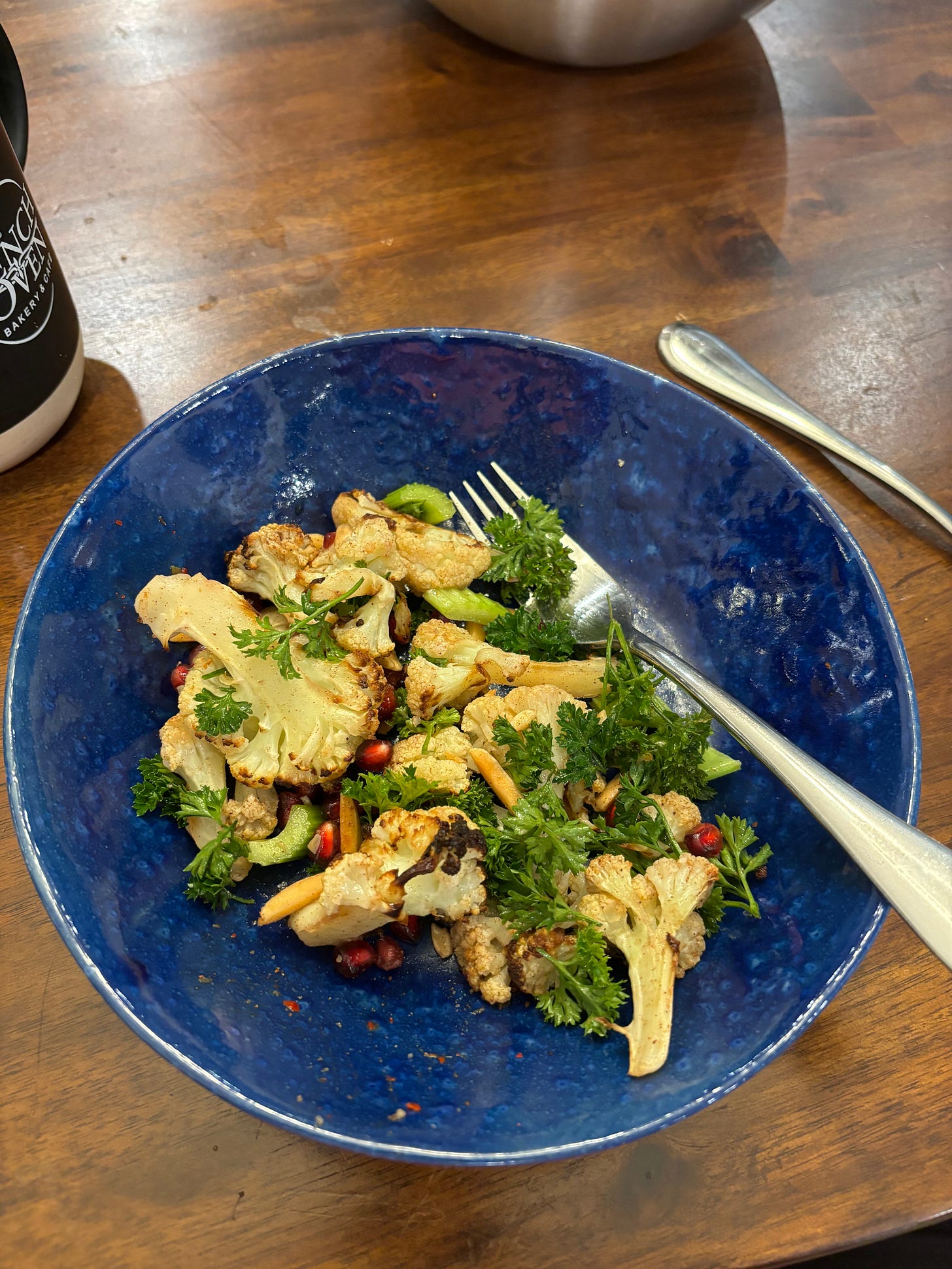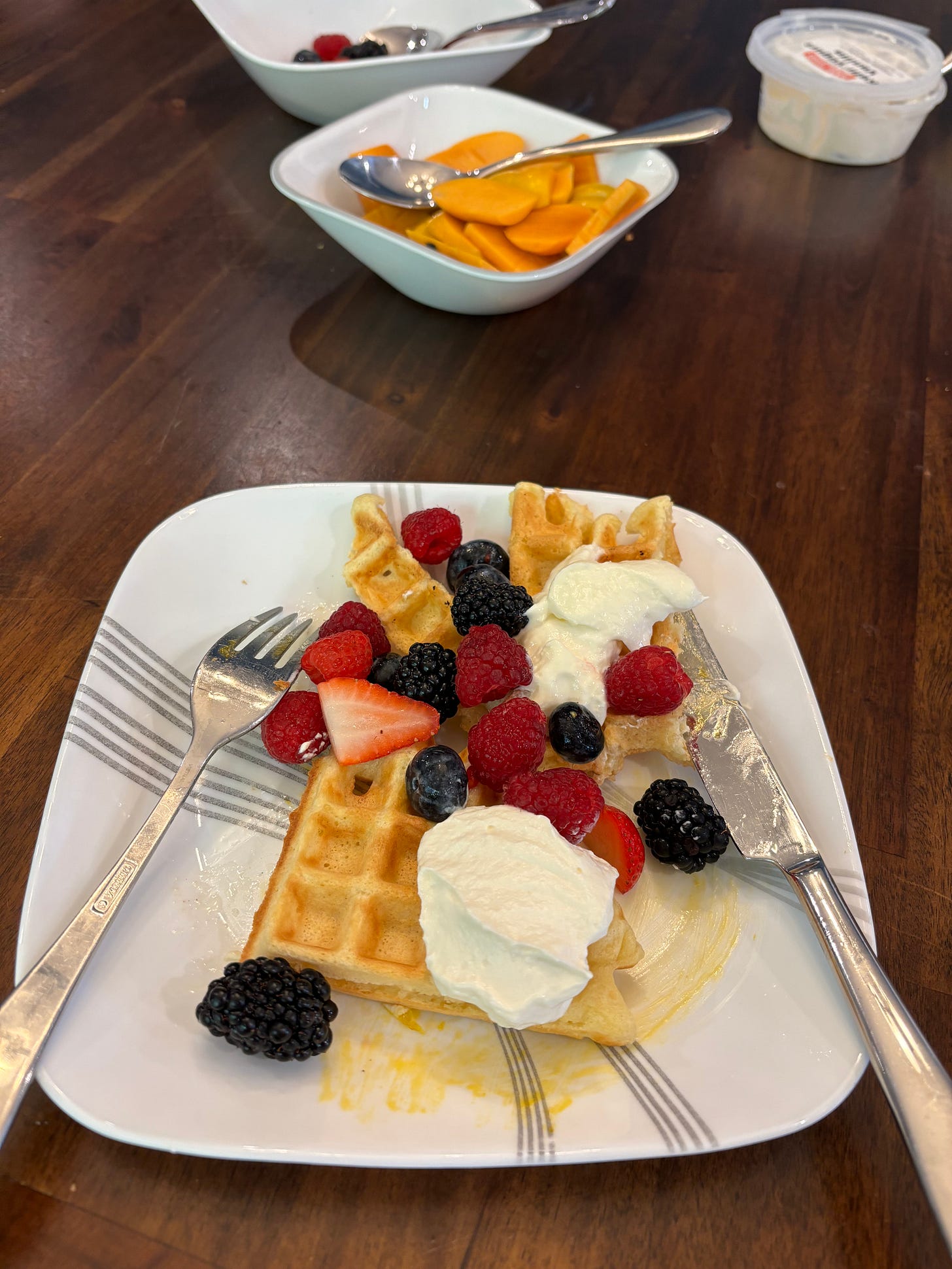Melons and things
We finally have a kitchen again (more to come on that when the renovations are 100% complete and not just 98% complete), and so I’ve resumed my old way of food buying: the CSA subscription box is back, my monthly chicken subscription from Pasturebird has resumed, and I’m buying more whole fruits and vegetables that I peel and chop myself. Which brings me to watermelon.
For a long time, I didn’t consider myself to be a proficient cook, or as someone who had any knife skills. Knives scared me, frankly. I was slow at chopping, and I once managed to cut myself and see a lot of blood when chopping broccoli. My cooking was mostly boiling pasta and heating up sauce that came in jars. I could chop tomatoes and onions and chicken breasts. You know, relatively small and easy things.
Then in 2020, we started a subscription to a CSA box and suddenly I was faced with vegetables that were much larger and harder than a tomato. Rockmelon*. Spaghetti squash. Butternut pumpkin**. All sorts of squashes, actually. These were objects that seemed like they required not only skill but also strength, and I felt like I had neither. My solution to the Big Hard Vegetable problem was to delegate the task of chopping them to my husband. This worked, for a time. At the time, we divided up cooking responsibilities to an extent, so it’s not like it was unusual for him to be in the kitchen. I just happened to leave the more intimidating knife work for him. In our kitchen division of labour, I cut up the onions and zucchinis, while he did the melon and squashes.
But alas, this was not a situation that was sustainable. Between 2021 and 2022, my husband had three back surgeries in the span of fifteen months (I do not recommend getting a herniated disc). After each surgery, he could not bend, twist or lift for eight to twelve weeks. Before each surgery, he was in such pain that many household and kitchen tasks were either extremely difficult or impossible. So for a couple of years there, all domestic and kitchen tasks were solely my domain. Including the melons and squashes. We were still getting the CSA box, and still getting deliveries every week of whole, hard, intimidating fruits and vegetables.
Well, shit. I needed to learn how to chop those damn things, then***. I watched some YouTube videos**** and got chopping. And I have thus far kept all of my fingers and there has been no blood shed! Now I can look at the contents of the CSA box without fear or trepidation, and know that if I get some hard vegetable, I can deal with it. Last week, I was chopping up a watermelon and thinking that for someone learning to deal with this category of Hard and Intimidating Produce, watermelons (and rockmelons, actually), are a great gateway into this world. They are hard, but only on the outside. Once you make that initial hard whack, they’re pretty soft on the inside for chopping. When the rind is off, they’re easier than zucchinis!
Talking to a young child about UPF
I’ve written before about ultraprocessed foods, about why I don’t like them and how I’ve been trying to reduce the amount that we eat. It’s all well and good to have these conversations with my husband and friends, and to write about it here. But it’s another thing when your six-year-old turns to you and innocently asks, ‘Why don’t you buy cheddar bunnies anymore? Are they bad?’ And then we get to the conflicting parts of me that think ‘Don’t teach her about foods being bad because you’ll ruin her relationship with food forever!’ and ‘But actually they’re not great even though they might be better than other UPF but this is still a UPF and not really giving you anything nutritionally and why don’t you eat an apple instead?’.
So I tried to explain to her that cheddar bunnies and Goldfish aren’t bad per se (I did not use the term ‘per se’ to her), but that there are other foods that have more vitamins and nutrients and do more good things for our bodies. Those are foods that mostly come from the ground, like fruits and vegetables and nuts, and that’s why we try to eat more of those than foods that come from factories.
And then she said, ‘But doesn’t cheese come from factories?’ Which is when I realised that there is a lot of complexity to simplifying concepts. I told her that yes, the cheese we buy and eat does come from factories, but that there are lots of different types of foods that come from factories, and some are better for our bodies than others. When we were next inside, we looked at the ingredient list on a packet of Goldfish and compared it with the ingredient list on a block of cheddar cheese. I’m not really sure how much of this she is understanding and absorbing, or how much she even cares about it. It seems like there is so much to know about where our food comes from and what it means even for adults, that it can be hard to figure out which ones are the key points that kids should know. The impacts of climate change? The marketing tricks of food companies? The physical and health effects of UPF? All of it? Why isn’t there a picture book about this?
Bonus food photos
I mentioned earlier that we have a kitchen again! It is glorious! Here are some photos of meals I’ve cooked in the past couple of weeks.
(Chicken from Pasturebird, recipe from the Recipe Tin eats cookbook)
(Yotam Ottolenghi’s cauliflower salad, which I’ve made about five times in the past two weeks)
(Waffles made with King Arthur flour, Vital Farms eggs, and Maple Hill milk. Topped with berries and kefir yoghurt from the farmers’ market)
*Cantaloupe
**Butternut squash
***I definitely got the easier deal out of the arrangement. Would much rather gain knife skills than experience great physical pain and need three back surgeries.
****I don’t remember which specific YouTube videos I watched, because it was vegetable-specific and years ago now. But I will say that I have learnt a lot about cooking from the Epicurious YouTube channel.







That cauliflower salad looks pretty nice. I've passed the recipe onto my wife cos she loves making salads. That chicken one looked nice too but I'm a vegetarian. As for explaining UPF, I've found that whatever the subject, all explanations are gross simplifications because as your understanding and knowledge grow, you see more nuance and more exceptions to the rule. It sounds like you have really interesting and grown-up conversations with your child.